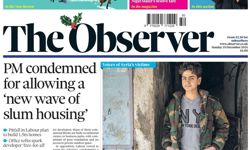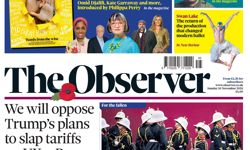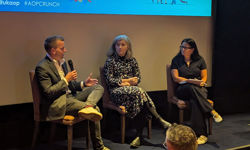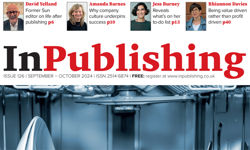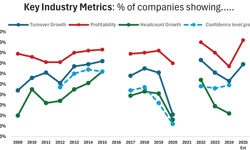
Alexandra Villoch, president and publisher of the Miami Herald, has a devotion to freedom of the press that goes beyond mere appreciation of the importance of the first amendment of the US constitution.
Villoch takes obvious pride that after working in banking and aviation, she now works in an industry whose freedoms were specifically named in the constitution because they were seen as vital to “a balance of government and a successful democracy”.
But is goes further than that.
Villoch was born in Castro’s Cuba and left for Florida with her parents in 1960 when she was three.
“Everything was stripped away. My father would tell you the first thing the government did was shut down the press because if you control the press you control the people,” says Villoch who has experienced on the ground similar processes playing out over the years in Venezuela, Guatemala and Peru.
“So, I believe so deeply in our mission,” she explains, a mission to provide vetted, credible journalism, something which Villoch believes, has been given even greater impetus in an age of fake news.
Making a difference
There have been single years when the Herald’s watchdog reporting has led to no less than three mayors being indicted and removed from office.
An investigation into deaths of elderly care home residents as a result of lack of air conditioning after September’s hurricane Irma, produced immediate results.
In the face of opposition, the Miami Herald went to court, under freedom of information legislation, to get access to government records and following the paper’s investigation, the state of Florida now requires all nursing homes to have back-up generators should electricity supplies fail.
Yet to be able to afford lawyers to go to court on the paper’s behalf and fund sustained investigative journalism, first of all, Villoch emphasises, you need a healthy thriving business.
“I always say, no margin, no mission. If you don’t have the business anchored down, you cannot continue to provide this community resource,” adds Villoch who has worked for the Herald, part of the McClatchy newspaper group, for seventeen years and is also in charge of six other McClatchy dailies in the east of the US.
“A profitable business and therefore sustainable – that’s my job. It’s what keeps me energised and in this business,” says the Miami Herald publisher, who adds that she doesn’t know any business in any industry that is not going through a severe transformation driven by the digital age and changing customer habits.
For the Herald, in common with many American newspapers, it has been hard, incredibly hard, she concedes.
But Villoch could look through “a long lens of history” and continuity when going through the necessary and difficult move to a digital first business.
The paper was founded in 1903 and bought by the McClatchy group in 2006, which in turn traces its newspaper origins back to 1856. The Miami Herald has just added two more Pulitzer prizes to the 22 awarded in the past.
Changing business models
In recent years, all the big American metropolitan newspapers have struggled because their business model had been predicated on advertising revenue combined with low cover prices.
The model started to fail because important advertisers such as national retailers were in trouble and local classified advertising was hit by free outlets such as Craig’s List, even before the rise of Google and Facebook.
There was however one saving grace, according to Villoch.
“We are still producing content that people want. It is not like we are producing buggy whips when nobody has buggies. People want our content more than ever before, it’s just the way that content was funded that has basically failed,” she explains.
The Miami Herald is now several years down the paywall route, a paywall that has tightened from 25 free articles at the outset to only five now before you have to subscribe.
The paper has started placing increasing emphasis on the value of its content and believes people are beginning to appreciate that professional journalism “is worthwhile, is critically important and therefore worth paying for”.
Local and global
The Miami Herald, and its Spanish-language sister paper, El Nuevo Herald, Villoch explains, operate “in a unique place” with sophisticated and often affluent readers who view the paper as a national and even international brand.
It is well known for its Latin American and Caribbean coverage, and apart from being the only paper with a dedicated reporter covering Guantanamo Bay, there are teams covering Cuba, Venezuela, Columbia and Haiti year-round.
“Miami is really a global city, so we get a lot of traffic to our website out of Europe, out of Canada, out of the north east of the US and the New York area, in addition to Latin America,” she explains.
It all adds up to around 1.1 million readers a week across both titles, more than 52 million online page views and what amounts almost to a TV channel with 5.9 million video views mostly on mobile.
The company no longer publishes separate print sales numbers, and talks now only about overall readership.
“Readership is what we measure. This is all part of the transformation. TV doesn’t ever say how many TV sets were turned on and radio doesn’t say whether the radio was turned on,” the Miami Herald executive argues.
Villoch acknowledges that once there were “multiples” of the reporters now in the newsrooms but argues that a mixture of data tools and a rigorous concentration on what readers value most – local and investigative reporting – has maintained the paper’s relevance and effectiveness.
There have been “deep investigative projects” into violence in Florida’s juvenile prison system and into deaths of children in the care of the Department of Children and Families, which transformed state funding within six weeks.
She also cites arts coverage as an example of change. No more critiques after the event, “read by six people” – instead there are articles in advance about a ballet or opera coming to town, explaining their importance, why people should go and how to get tickets.
The newsroom may not be as populous as once it was but Villoch says Miami Herald journalists rose to the challenge in a series of recent, not just national but international stories, on their patch.
Following Irma last year, in February there was the mass school shooting at Parkland and then a month later the fatal bridge collapse at Florida International University.
“We owned those breaking news stories. We were there first and didn’t just continue to cover them from a breaking news point of view but really in depth, what’s behind the stories,” says Villoch.
Pooling resources
The scale of Miami Herald coverage is boosted through co-operation – not just with the rest of the 29-strong McClatchy stable of dailies but also with erstwhile rivals.
The Herald co-operates with the nearby Tampa Times – there is very little overlap in the market – and even shares the work of Tampa Times reporters based in the state capital Tallahassee.
Even in south Florida, the paper partners with papers such as the Palm Beach Post and the Sun Sentinel on broader issues such as climate change.
There are also deals with Google and Amazon on content and owners of Alexa devices can now say: “Alexa read me the Miami Herald.”
Villoch turns again and again to the importance of trust and relevance and what you can actually believe, in difficult current circumstances. She used to advise confused readers to check their sources of news but now she adds you must also go to the original source.
During the Parkland shootings coverage, the Miami Herald experienced for the first time not just fake news but “the fraudulent alteration of two of our reporters’ Facebook and Twitter accounts.” The police have been called in.
The Miami Herald executive also believes that newspapers and “the kind of journalism we do” have allowed themselves to be sucked into what she calls the entertainment TV news of Fox News, CNN and CNBC.
“If you are in the news business, you know there isn’t enough news to run 24-hours a day so to fill up the airtime, what they are doing is opinion,” says Villoch.
She says, by way of contrast, the Miami Herald is very conscientious in keeping the work of the newsroom free of any bias while clearly differentiating the views of individual columnists and the leader pages – the view of the paper – although she accepts not all readers understand such fine distinctions.
Encouraging diversity
Such a view is a conventional one in American newspapers but the Miami Herald stands out from the herd in a very different way from most newspapers – the number of women in top positions.
Apart from Villoch herself, the editor of the Miami Herald is Aminda Marques Gonzalez, the editorial page editor is Nancy Ancrum, Lourdes Alvarez is in charge of marketing and communications and the managing editor of El Nuevo Herald is Nancy St Martin.
The Miami Herald publisher says the appointments are as much about diversity as gender.
“It’s also about race, culture; it’s about background and in a community as diverse as ours, if I didn’t have this kind of diversity challenging us, we would miss out on stories and being able to serve our advertisers because our customers are diverse,” says Villoch.
The paper also benefits from long-term community projects. It has organised the local school spelling bee competition for 70 years and a scholarship scheme for promising students for 60 years. Then there is the Wish Box bringing together the generosity of readers with local needs – in the American context everything from providing a wheelchair to funding a kidney transplant.
Can such a mission survive or will it have to change?
“It doesn’t change – to be the most credible source of news and information for our community and serving our community. Staying true to that mission regardless of the changes will make sure we are relevant and strong and make a difference five years from now, ten years and 25 years from now,” insists Alexandra Villoch, publisher of the Miami Herald.




